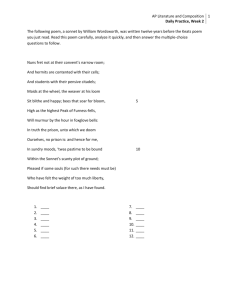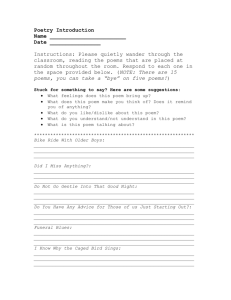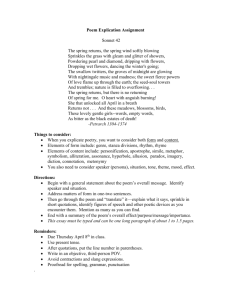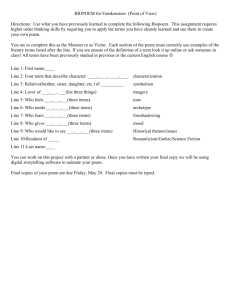Poetry Test Review Honors
advertisement
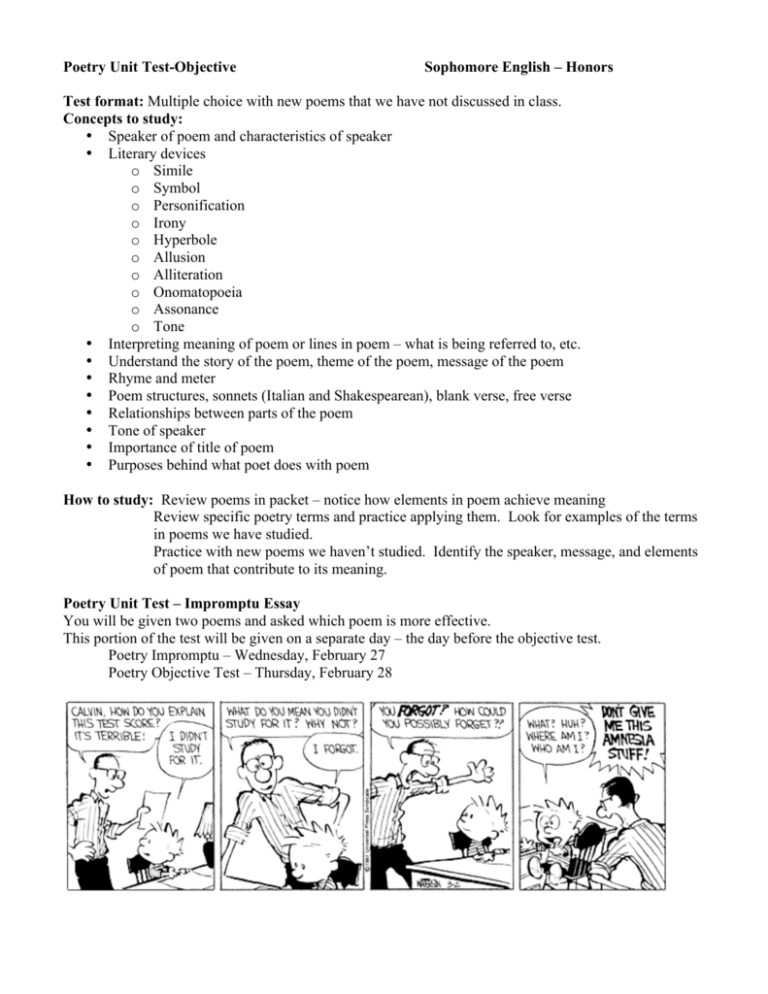
Poetry Unit Test-Objective Sophomore English – Honors Test format: Multiple choice with new poems that we have not discussed in class. Concepts to study: • Speaker of poem and characteristics of speaker • Literary devices o Simile o Symbol o Personification o Irony o Hyperbole o Allusion o Alliteration o Onomatopoeia o Assonance o Tone • Interpreting meaning of poem or lines in poem – what is being referred to, etc. • Understand the story of the poem, theme of the poem, message of the poem • Rhyme and meter • Poem structures, sonnets (Italian and Shakespearean), blank verse, free verse • Relationships between parts of the poem • Tone of speaker • Importance of title of poem • Purposes behind what poet does with poem How to study: Review poems in packet – notice how elements in poem achieve meaning Review specific poetry terms and practice applying them. Look for examples of the terms in poems we have studied. Practice with new poems we haven’t studied. Identify the speaker, message, and elements of poem that contribute to its meaning. Poetry Unit Test – Impromptu Essay You will be given two poems and asked which poem is more effective. This portion of the test will be given on a separate day – the day before the objective test. Poetry Impromptu – Wednesday, February 27 Poetry Objective Test – Thursday, February 28 Practice with Meter and Rhyme Scheme – Read the poem and answer the questions that follow. 1. The sea awoke at midnight from its sleep, 2. And round the pebbly beaches far and wide 3. I heard the first wave of the rising tide 4. Rush onward with uninterrupted sweep; 5. A voice out of the silence of the deep, 6. A sound mysteriously multiplied 7. As of a cataract from the mountain's side, 8. Or roar of winds upon a wooded steep. 9. So comes to us at times, from the unknown 10. And inaccessible solitudes of being, 11. The rushing of the sea-tides of the soul; 12. And inspirations, that we deem our own, 13. Are some divine foreshadowing and foreseeing 14. Of things beyond our reason or control. 1. What is the rhyme scheme of the octet? a. abbaabba b. ababcdcd c. abcaabca d. aabbaabb 2. What is the rhyme scheme of the sestet? a. cdcdaa b. cdecde c. efefgg d. cdcdee 3. The meter of this poem is a. iambic tetrameter b. anapestic tetrameter c. iambic pentameter d. trochaic pentameter 4. This is an example of what type of poem? Be specific in your answer. a. an Indonesian sonnet b. a Shakespearean sonnet c. a Petrarchan sonnet d. an Elizabethan sonnet Match the following 5. iamb a. understand 6. trochee b. gallant 7. dactyl c. but soft 8. anapest d. hickory Answers: 1. a 2. b 3. c 4. c 5. c 6. b 7. d 8. a 1. He thought he kept the universe alone; 2. For all the voice in answer he could wake 3. Was but the mocking echo of his own 4. From some tree-hidden cliff across the lake. 5. Some morning from the boulder-broken beach 6. He would cry out on life, that what it wants 7. Is not its own love back in copy speech, 8. But counter - love, original response. 9. And nothing ever came of what he cried 10. Unless it was the embodiment that crashed 11. In the cliff's talus on the other side, 12. then in the far distant water splashed, 13. But after a time allowed for it to swim, 14. Instead of proving human when it neared 15. And someone else additional to him, 16. As a great buck it powerfully appeared, 17. Pushing the crumpled water up ahead, 18. And landed pouring like a waterfall, 19. And stumbled through the rocks with horny tread, 20. And forced the underbrush-and that was all. 1. In this poem, the speaker perceives that for human beings nature is most like which of the following? (A) Nurturing and supportive (B) Hostile and violent (C) Unpredictable and unknowable (D) Unaware and indifferent (E) Oppressive and sinister 2. Which of the following is the best interpretation of "He thought he kept the universe alone" (line!)? (A) He maintained a detached attitude toward society. (B) He felt that he was utterly alone in the world. (C) Through contemplation, he merged his whole self with nature. (D) Because of special insight, he felt he alone knew the essence of the universe. (E) He kept to himself entirely and avoided any contact with other living things. 3. The echo is "mocking" (line 3) because the speaker (A) had hoped for some response to his call (B) is cynical about other human beings (C) has despaired of the existence of God (D) is being ridiculed by other travelers in the woods (E) is humorously criticizing himself and his aloneness 4. The primary implication of lines 5 through 8 is that (A) human beings are possessed of a primal need for one another (B) life is richer when one knows who one 's antagonist is (C) one understands oneself well only after being measured against others (D) life and nature eternally oppose and frustrate the essential needs of human beings (E) each human being is like a copy of a masterpiece whose essence remains a mystery 5. Which of the following is the critical transition point in the poem? (A) "He would cry out . ." (line 6) (B) "And nothing ever came . . ." (line 9) (C) "Unless it was . . ." (line 10) (D) "But after a time . . ." (line l3) (E) "As a great buck. . ." (line 16) 6. Which of the following is the most accurate statement about the word "embodiment" (line 10)? (A) It is an indirect reference to the ''universe'' (line 1). (B) It is a simile for the "echo" (line 3) of the speaker. (C) It is a metaphor for boulders and "talus" (line 11). (D) It is a pronoun foreshadowing the "him" in line 15. (E) It is an abstract noun denoting the "buck" (line 16). 7. The figure of speech in line 18 is (A) a simile (B) personification (C) a symbol (D) an extended metaphor (E) allegory 8. As the buck is presented in lines 16-20, the effect is one of a (A) beautiful and enchanting presence (B) primeval and impervious force (C) hostile and destructive power (D) curious and animated intelligence (E) cunning and deceptive spirit Answers: 1. D 2. B 3. A 4. A 5. C 6. E 7. A 8. B Sample Questions for “To An Athlete Dying Young” and “Ex-Basketball Player” 1. All of the following metaphors in “To An Athlete Dying Young” are correctly paraphrased except a. “the road all runners come” = the road to the cemetery b. “your threshold” = the edge of an open grave/edge of land of dead c. “fields where glory does not stay” = playing fields d. “lads that wore their honors out” = boasting athletes whose fame died before them 2. The tone of the poem is created chiefly from which of the following? a. The speaker’s congratulations to a dead youth. b. A melancholy comparison of a happy triumph and somber funeral. c. The eloquent description of a dead hero’s funeral d. The irony of a winning runner’s losing the race of life. 3. The story of the glory days of a basketball star in “Ex-Basketball Player” placed beside the persona’s comments and disappointed attitude does which of the following? a. Paints a tragic picture Answers: b. Sharpens the poem’s ironic message about glory fading 1. a c. Creates humor 2. a d. Highlights the persona’s sense of horror 3. b 4. d 4. The tone of “Ex-Basketball Player” is a. humorous c. admiring b. mournful d. disappointed 1. 2. 3. Do not go gentle into that good night, Old age should burn and rave at close of day; Rage, rage against the dying of the light. 4. 5. 6. Though wise men at their end know dark is right, Because their words had forked no lightning they Do not go gentle into that good night. 7. 8. 9. 10. 11. 12. 13. 14. 15. Good men, the last wave by, crying how bright Their frail deeds might have danced in a green bay, Rage, rage against the dying of the light. Wild men who caught and sang the sun in flight, And learn, too late, they grieved it on its way Do not go gentle into that good night. Grave men, near death, who see with blinding sight Blind eyes could blaze like meteors and be gay, Rage, rage against the dying of the light. 16. And you, my father, there on the sad height, 17. Curse, bless, em now with your fierce tears, I pray. 18. Do not go gentle into that good night. 19. Rage, rage against the dying of the light. 1. Which of the following IS NOT an attitude 3. How does the author suggest one should one of the men displays? meet death? a. resistingly aware a. prayerful acceptance b. unexpected melancholia b. challenging preparedness c. determined rage c. solemn resistance d. wistful regret d. amiable resignation e. solemn objectivity e. angry opposition 2. The most important shift in the passage 4. Where does the author reveal his occurs in ambiguity toward his father and his a. line 16 impending death? b. line 4 a. the various characterizations of men c. line 10 b. line 17 -­‐ "Curse, bless..." d. both a and b c. "...dying of the light" e. none of the above d. "...your fierce tears..." e. reference to death as "that good night" Answers / Explanation 1. Which of the following IS NOT an attitude one of the men displays? a. resistingly aware -­‐ wise; "know dark is right...do not go gentle" b. unexpected melancholia -­‐ wild; "too late, they grieved it" c. determined rage -­ what author suggests/repeats, none display d. wistful regret -­‐ good; "deeds might have danced" e. solemn objectivity -­‐ grave; "see with blinding sight" 2. The most important shift in the passage occurs in a. line 16 -­ general (suggestion/characterization) to specific (author's father) b. line 4 -­‐ author's suggestion to characterization of men c. line 10 -­‐ distractor, middle of poem d. both a and b -­‐ both true, but a is "the most important" e. none of the above 3. How does the author suggest one should meet death? a. prayerful acceptance -­‐ "I pray" (referring to father, line 17), never suggests accepting b. challenging preparedness -­ MOST correct c. solemn resistance -­‐ "rage against the dying..." (resistance), not solemn rage d. amiable resignation -­‐ "wise men know dark is right" (resignation, line 4), no amiability e. angry opposition -­‐ "rage against..." repeated often, doesn't suggest anger/bitterness 4. Where does the author reveal his ambiguity toward his father and his impending death? a. the various characterizations of men -­‐ he can't categorize his father b. line 17 -­ "Curse, bless...," contradictory reactions to death c. "...dying of the light" -­‐ distractor, personification d. "...your fierce tears..." -­‐ distractor, unusual juxtaposition e. reference to death as "that good night" -­‐ ambiguous pun, not refer to father only Enigma (A riddle in poetic form) I talk, but I do not speak my mind I hear words, but I do not listen to thoughts When I wake, all see me When I sleep, all hear me Many heads are on my shoulders Many hands are at my feet The strongest steel cannot break my visage But the softest whisper can destroy me Answer: An actor These enigmas are taken from 'The Girls Own Book' by Mrs Child, 1864 'Tis true I have both face and hands, And move before your eye; But when I move, I always stand, And when I stand I lie. Answer: A clock 'Tis in the church, but not in the steeple; 'Tis in the parson, but not in the people; 'Tis in the oyster, but not in the shell; 'Tis in the clapper, but not in the bell. Answer: The letter R



